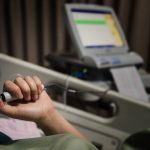KARLY MCMASTER, ND
While the standard of care following a diagnosis of celiac disease (CD) is to prescribe a gluten-free diet (GFD), the recommended long-term management and monitoring of the condition is poorly understood. Too often, patients with CD are given a diagnosis, told to follow a GFD, and never further monitored. Assessment of a patient’s gluten-free lifestyle requires a careful history to ensure the patient fully understands the severity of their condition and the level of adherence they need to follow. Additionally, routine follow-up monitoring is essential to preventing sequelae of CD. Years later, patients with inadequate CD management, or undiagnosed CD, can present with a variety of concerns, such as migraines, chronic joint pain, fragility fractures, hair loss, or skin irritation. Any of these may be directly related to CD or to secondary autoimmunity yet be easily overlooked.1 With our guiding principle of preventative medicine, naturopathic doctors should ensure that patients with CD as well as other autoimmune conditions are being routinely screened based on the recommended and evidence-based guidelines.
Importance of Clinical Diagnosis
Patients with CD often have positive serum anti-transglutaminase antibodies but are never diagnosed by duodenal biopsy to confirm a clinical diagnosis of CD. The Government of Canada provides limited financial assistance as a tax program to account for the significant difference in costs of standard vs gluten-free foods; however, this program is complex and often not realistic for individuals to claim every gluten-free expense.
Regardless, there are several other factors that underline the importance of being clinically diagnosed. For example, the diagnosis relays the severity of a patient’s condition and how strictly they need to comply with a GFD. Additionally, it empowers patients to advocate for the screening and prevention of known sequelae of CD. It also provides justification for direct family members to be screened, either through serum antibody testing or genetic testing for either HLA-DQ2 or HLA-DQ8 as a negative predictive value. Many physicians are not aware that HLA testing can be done through some large commercial laboratories for the assessment of CD. Additionally, with clinical diagnosis of malabsorption syndromes, including CD, additional nutritional lab testing is included under the Medical Services Plan (MSP) in British Columbia – Vitamin D testing, for example.2 With the clinical diagnosis, patients can also choose to participate in medical trials for the advancement of medical care. For these reasons, it is crucial that patients are clinically diagnosed so that they receive proper management of the disease.
Initial Lab Testing & Gold Standard Diagnostics
Patients diagnosed by serum testing of anti-transglutaminase, anti-gliadin, or anti-endomysial antibodies require referral to a gastroenterologist for clinical diagnosis via gastroscopy and duodenal biopsy.3 It is critical, while patients await their gastroscopy procedure, that they continue to consume gluten, to ensure accurate biopsy results. Patients are recommended to eat 2-4 slices per day of gluten-containing bread for at least 2 weeks prior to serology or biopsy testing, although this amount of gluten exposure and length of time is highly debated. Repeat gastroscopy is also a highly debated topic among physicians; however, most research supports the recommendation that patients have a repeat gastroscopy and biopsy after 1 year of diagnosis to ensure that the histology demonstrates healing of the intestinal microvilli. In my clinical experience, this is rarely done. As naturopathic doctors, we should be encouraging patients to maintain a clinical relationship with their gastroenterologist, as confirming this histological change is the only established means of assessing healing. Symptoms, serology, or other non-invasive means of monitoring are poor predictors of healing, and thus can falsely represent patient progress.4 A likely contributing factor to the confusion surrounding follow-up recommendations and timing is the lack of unified consensus among the various organizations offering guidelines. A comparison of these differences among North American and world guidelines is outlined in Table 1.
Table 1. Comparison of Testing & Timing Guidelines
| Anti-tTG Ab, serum | Gastroscopy & Biopsy | Nutritional Consult | Further Testing | |
| CCA5 | Repeat at 6 months, 1 year, then annually Repeat with symptom recurrence | With abnormal serology or persistent symptoms | At diagnosis Repeat at 3 months, then by request until annual follow-up Repeat with symptom recurrence | At the time of diagnosis: Nutritional deficiency screening, liver panel, TSH, bone mineral density scan Repeat above screening at 6 months, at 1 year, then annually if previously abnormal Repeat TSH every 2 years |
| AGA6 | Repeat at 6 months, 1 year, then annually | With abnormal serology or persistent symptoms | (Not discussed) | (Not discussed) |
| NASPGHAN7 | Repeat at 6 months, then annually if patient is asymptomatic Repeat PRN for patients with persistent or recurring symptoms | With abnormal serology With normal serology but high suspicion | Periodic assessment of adherence | Periodic assessments of symptoms, growth, physical exam At time of diagnosis: Screening for T1DM and thyroiditis HLA testing for normal anti-tTG but high suspicion |
| WGO8 | Repeat q 3-6 months until abnormal baseline tests are corrected or until clinical stabilization Then repeat q 1-2 years | Repeat biopsy and timing is not well defined; should be considered in patients with persistent symptoms | Repeat q 3-6 months until clinical normalization Then q 1-2 years Repeat for women in child-bearing years and during pregnancy | At time of diagnosis: CBC w/ diff, iron status, vitamin B12, calcium, vitamin D, bone mineral density scan |
Case Study
The following case study will illustrate how a lack of long-term management can lead to a poor outcome.
A 32-year-old female presented to my office with a clinical diagnosis of CD, which was diagnosed at age 17 per positive anti-tTG Ab and duodenal biopsy. She reported following a GFD 95-98% of the time, but her household still contained gluten-containing foods and she did regular baking with wheat flour for her family. She had been diagnosed repeatedly with iron deficiency throughout her early adult years, but had never responded to oral iron prescriptions. She had not had repeat antibody screening or biopsy after diagnosis.
Her TSH was screened at her first pregnancy, which was within normal limits; however, with screening at the beginning of her second pregnancy, it was determined that she had hypothyroidism and she was started on 25 µg/day of levothyroxine. She reported that her thyroid was not checked throughout her pregnancy and that she was told by her physician to discontinue the levothyroxine post-partum, without further testing. She presented to her family doctor approximately 2 months later with significant hair loss. TSH was retested and measured at 20.22 mU/L (RR: 0.32-5.04 mU/L); free T4 (fT4) was 7.3 pmol/L (RR: 10.6-19.7 pmol/L). She was started on 50 µg/day of levothyroxine. The hair loss continued, so her thyroid function was retested 2 months later. TSH was 21.57 mU/L and the fT4 was 9.8 pmol/L, so the levothyroxine was increased to 150 µg daily.
One week after the dosage of levothyroxine was increased to 150 µg, she presented to my office 5 months post-partum with significant hair loss, low energy, and brain fog. We discussed the importance of autoantibody screening, given her diagnosis of CD and the potential for autoimmune thyroid involvement. At this time, I discontinued her self-administration of 10 000 µg per day of biotin, to ensure future thyroid testing was accurate; I also recommended that future thyroid testing be performed after an overnight fast and in the morning before levothyroxine administration in order to create a new baseline for comparisons. I ordered a complete thyroid panel and a repeat anti-tTG test, which showed the following:
- TSH = 0.90 mU/L (RR: 0.32- 5.04 mU/L)
- fT4 = 19.0 pmol/L (RR: 10.6-19 pmol/L)
- fT3 = 4.45 pmol/L (RR: 2.60-5.80 pmol/L)
- Thyroperoxidase (TPO) Ab = >600 (RR: <35 IU/mL)
- Tissue-transglutaminase Ab (anti- tTG), IgA = >250.0 U/mL (RR: <12.0 U/mL)
This testing, along with her other symptoms, confirmed a diagnosis of Hashimoto’s thyroiditis. The elevated anti-tTG antibodies could be due to cross-reactivity with the anti-TPO antibodies and/or be reflective of undiagnosed autoimmune thyroiditis or uncontrolled celiac disease. Regardless, she was referred back to her family doctor for a standing order for testing of anti-tTG, anti-TPO, and anti-thyroglobulin (anti-TG) every 3 months for 12 months, along with my recommendation for referral to a gastroenterologist for repeat gastroscopy and duodenal biopsy.
Unfortunately, my clinical experience is that patients with CD have poor management and follow-up, and that while this case is an extreme example, as naturopathic doctors we should be educating our autoimmune patients that routine screening is important for preventing autoimmune sequelae. This is even more important at times of hormonal changes, such as pregnancy. A study of Dutch patients with CD reported that 12% of those CD patients were later diagnosed with Hashimoto’s thyroiditis.9 Potentially, had this patient been screened following her initial diagnosis of CD, monitored annually, and had antibody testing along with routine thyroid screening in early pregnancy, doctors would have arrived at her diagnosis before symptom severity progressed. The Canadian Digestion Health Foundation reports that approximately 30% of adults with CD have secondary autoimmune conditions, thus underlining the importance of thorough history-taking and adequate screening.10
Recommended Guidelines: A Naturopathic Perspective
Developing a consensus on the recommendations of management for patients with celiac disease is greatly needed. A 2010 survey of gastroenterologists in Canada, examining their long-term management of patients with CD, showed that 76% of them provide routine follow-up care for patients with CD, and 65% include serology testing as part of that follow-up care. Additionally, 36% of respondents reported rarely performing follow-up duodenal biopsy. This study had only a 43% response rate and had greater response from practitioners within their first 10 years of practice, which may demonstrate a margin of positive reporting bias.11 My clinical observation has been that patients with CD are rarely aware that routine follow-up is recommended, and they have rarely had repeat serum testing or duodenal biopsy. The lack of consensus among recommendations for long-term management may be adding to physicians’ confusion surrounding post-diagnosis management decisions. Additionally, there could be a general lack of awareness of the various recommendations regarding long-term management and screening tests for patients with CD.
Naturopathic doctors are primary care physicians. Therefore, it is our duty to ensure these patients have adequate screening and reinforce the stringency of following a GFD and, more so, a celiac lifestyle. Based off an amalgamation of current recommendations, naturopathic doctors should repeat serology for patients at 6 and 12 months post-diagnosis. In addition, a duodenal biopsy should be repeated in patients with persistent abnormalities or symptomology. The discussion regarding adherence to a GFD should be ongoing, nutritional serology should be done at the time of diagnosis, and repeated annually if the testing was previously abnormal. Additional autoimmune screening should be strongly considered in patients with ongoing inflammation, and possibly performed periodically in patients with CD. For patients who have not experienced long-term management, consider a general screen, as discussed above, at the initiation of your doctor-patient relationship. A collaborative, integrated healthcare team is required for CD patients for proper long-term management and the best possible clinical outcome. For my patients, I also suggest involvement with advocacy groups for additional resources and support, such as the Canadian Celiac Association, Celiac Disease Foundation, National Celiac Association, etc.
References:
- Zipser R, Farid M, Baisch D, et al. Brief report: Physician awareness of celiac disease. J Gen Intern Med. 2005;20(7):644-646.
- LifeLabs. Announcement: Dr Virginia Walley, Medical Director, ON. December 12, 2010. Lifelabs Web site. https://www.lifelabs.com/hcps-newsletter/announcement-dr-virginia-walley-medical-director-on/?myProvince=bc. Accessed January 15, 2021.
- James S. National Institutes of Health Consensus Development Conference statement on Celiac Disease, June 28-30, 2004. Gastroenterology. 2005;128(4 Suppl 1):S1-S9.
- Haines M, Anderson R, Gibson P. Systematic review: the evidence base for long-term management of coeliac disease. Aliment Pharmacol Ther. 2008;28(9):1042-1066.
- Canadian Celiac Association. A Resource For Health Care Professionals: Follow- Up Management For Patients With Celiac Disease. March 2016. Available at: https://www.celiac.ca/wp-content/uploads/2020/02/Management-Resource-for-Physicians.pdf. Accessed January 14, 2021.
- Husby S, Murray J, Katzka D. AGA Clinical Practice Update on Diagnosis and Monitoring of Celiac Disease—Changing Utility of Serology and Histologic Measures: Expert Review. Gastroenterology. 2019;156(4):885-889.
- North American Society for Pediatric Gastroenterology, Hepatology and Nutrition. Diagnosis and Treatment Of Celiac Disease In Children: Clinical Practice Guideline Summary. 2021. NASPGHAN Web site. https://naspghan.org/files/documents/pdfs/medical-resources/celiac/CeliacGuidelineSummary.pdf. Accessed January 14, 2021.
- World Gastroenterology Organisation. Celiac Disease. 2016. Available at: https://www.worldgastroenterology.org/guidelines/global-guidelines/celiac-disease/celiac-disease-english. Accessed January 14, 2021.
- Hadithi M. Coeliac disease in Dutch patients with Hashimoto’s thyroiditis and vice versa. World J Gastroenterol. 2007;13(11):1715.
- Canadian Digestive Health Foundation. Statistics on Celiac Disease. 2021. Canadian Digestive Health Foundation. CDHF Web site. https://cdhf.ca/digestive-disorders/celiac-disease/statistics-on-celiac-disease/. Accessed January 15, 2021.
- Silvester JA, Rashid M. Long-term management of patients with celiac disease: current practices of gastroenterologists in Canada. Can J Gastroenterol. 2010;24(8):499-509.

Karly McMaster, ND is a licensed naturopathic physician practicing in Delta, British Columbia. Dr McMaster received her Bachelor of Science in medical biochemistry from The University of British Columbia Okanagan, and she is a graduate of The Boucher Institute of Naturopathic Medicine. Due to her personal background of living with celiac disease and other autoimmune conditions, Dr McMaster’s clinical focus is the treatment of autoimmune conditions and gastroenterology. She is a member of the GastroANP, BCNA, and CCA. To learn more about Dr McMaster, visit her website at www.drkarlymcmaster.com.





